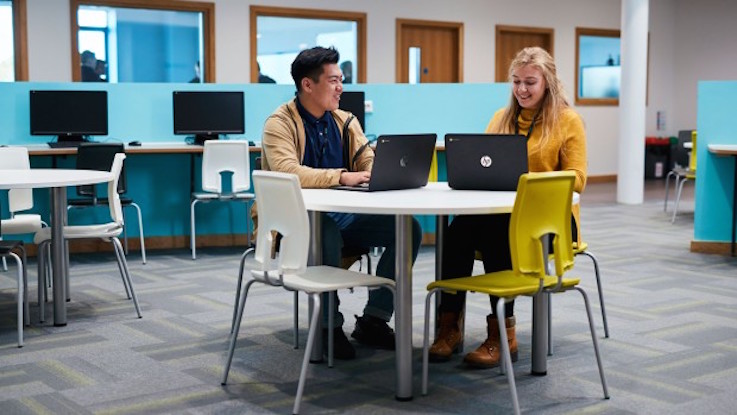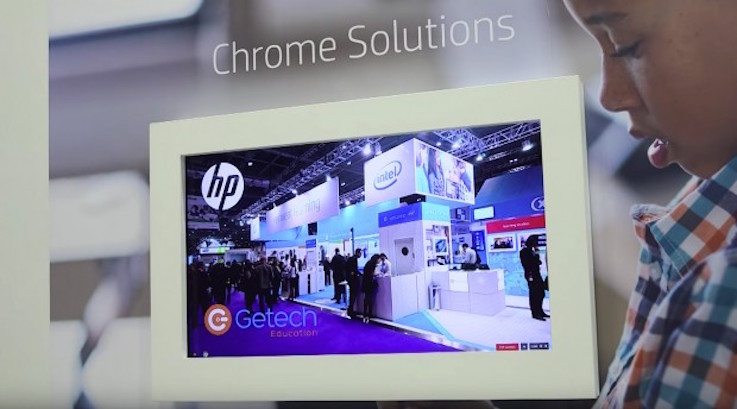BETT 2017: don't drown schools in wave of ed tech
Finding the right tech in the flood of options isn't easy for schools


Schools don't have an easy job educating the future of Britain (when the future of Britain wants to faff about on their smartphones) on tight budgets with constant threat of government audit.
Technology is supposed to make that job easier such is the promise of many of the stands at BETT 2017, at Excel in London last week and in many ways it has, but the flood of devices across multiple platforms risks making the procurement and management too complex, let alone the added pain to teacher training.
Consider when you choose a smartphone or laptop. Not only must you find the option with the right hardware at the right price, but the platform you choose will inform your choices for years to come most Apple users stick to iPhones rather than considering an Android each and every upgrade cycle, and with good reason. Who wants to face a UI learning curve every two years, or rebuy apps you've already paid for?
Now spread that pain across an entire school. If you choose a Microsoft mix of tablets and laptops, good luck making use of those clever Android innovations; if you shell out for Chromebooks, Apple's education efforts are lost to you. And once you've bought into a platform, switching away from it is a challenging project. Most hardware upgrades are class by class, meaning that opting for a new platform will cause some students to be Apple and others to be on Android a mix that's a pain for corporate administrators with a well-staffed department, let alone understaffed schools on a tight budget.
That's true also for teacher training. Google, Microsoft and Apple each offer "badge" based training programmes, so teachers can learn the best way to use such ed tech in their classrooms, track their own progress, and prove their work to others but what happens if you move to another school that uses a different platform, or your own school switches to a new one? Time to start at the bottom, learning a new system from scratch.
HP's education business director, Neil Sawyer, suggested it's preferable to have a mix of tech, and it would indeed be good for children to see a variety of options, rather than be raised thinking Microsoft, Apple or Google were the only way to work, but as ideal as that vision may seem, that's a tough ask for school IT managers and teacher training.
And walking around the show floor at BETT, there's many more options to consider than laptops or mobile devices: what about smart boards or classroom displays, VR or AR headsets, 3D scanners and printers, and all the other gadgets and gizmos that promise to bring fun into the classroom and engage students?
Sign up today and you will receive a free copy of our Future Focus 2025 report - the leading guidance on AI, cybersecurity and other IT challenges as per 700+ senior executives
Making the right choice is nigh on impossible. While the various innovations on show at BETT 2017 were encouraging and exciting imagine having AR, Minecraft and Lego robots in your classroom as a young student the flood of tech vying for a slice of teachers' attention and schools' budgets is surely overwhelming.
What's the answer? Bigger budgets for schools and more training time for teachers would be a grand solution, but reality suggests neither are likely. Shows like BETT 2017 can help, so long as educators manage to eschew shopping at the stands for the many informative hands-on workshops and case study seminars on offer, sharing knowledge, advice and best practice. Raspberry Pi's new magazine, Hello World, is a grand idea to let teachers and their colleagues learn about platforms and technology other than that in their own classrooms.
But the IT industry needs to do better, too. Improvement has been made in ease of management, led by Chromebooks, but that needs to be followed by simplified procurement, too. One easy win is longer trial times Microsoft offers teachers free trials of Minecraft as well as free student logins, in order to let them get to grips with the software before shelling out for it. Such trials are handy imagine buying a classroom's worth of licences for Minecraft only to find out students had moved on to Lego or another gaming trend.
Sorting the gems from the guff at a show as big as BETT isn't an easy task. The industry should do anything it can to make it easier for educators to make the right choice, regardless of platform or hardware, so schools can keep their focus where it should be, on students.
Freelance journalist Nicole Kobie first started writing for ITPro in 2007, with bylines in New Scientist, Wired, PC Pro and many more.
Nicole the author of a book about the history of technology, The Long History of the Future.
-
 European Electronique’s Freedom Cloud
European Electronique’s Freedom CloudSponsored Freedom Cloud helps schools move to a fully managed public or hybrid cloud with educational IT provision
-
 C-Learning puts the "cloud first" in education
C-Learning puts the "cloud first" in educationSponsored UK schools and colleges are only just entering the cloud revolution
-
 Getech Education helps schools move to the cloud
Getech Education helps schools move to the cloudSponsored Taking a school's classroom IT to the cloud needs careful consideration
-
 RM Buzz from RM Education
RM Buzz from RM EducationSponsored RM Buzz adds user-focused filtering on Chromebooks for students using RM Unify and G Suite for Education
-
 How teachers brought Minecraft into classrooms
How teachers brought Minecraft into classroomsNews Microsoft and Minecraft reveal new teacher tools for using the game in schools
-
 HP: VR and two-in-ones are the future of ed tech
HP: VR and two-in-ones are the future of ed techAnalysis HP's head of education predicts the future of technology in classrooms
-
 Why fun tech is good for schools
Why fun tech is good for schoolsAnalysis Lego and Minecraft are sweeping education tech – but do they offer more benefit than making school fun?
-
 Simplifying tech for schools
Simplifying tech for schoolsAnalysis Chromebooks, Microsoft Intune and more are trying to make it easier for schools to buy and manage technology


